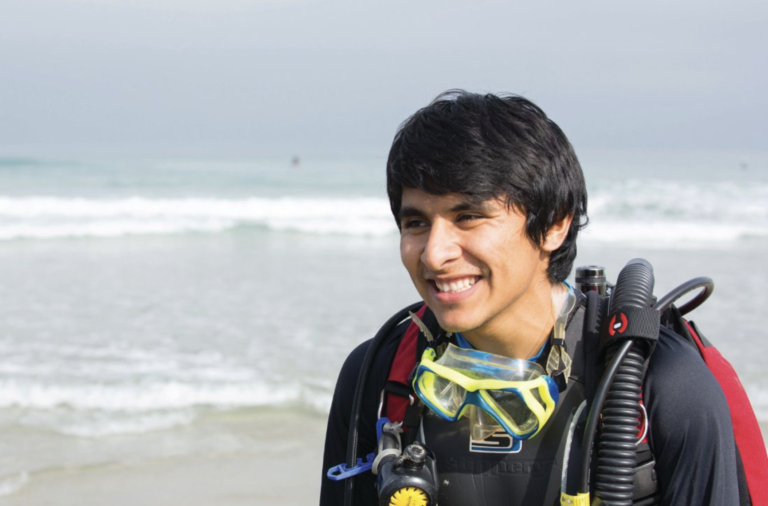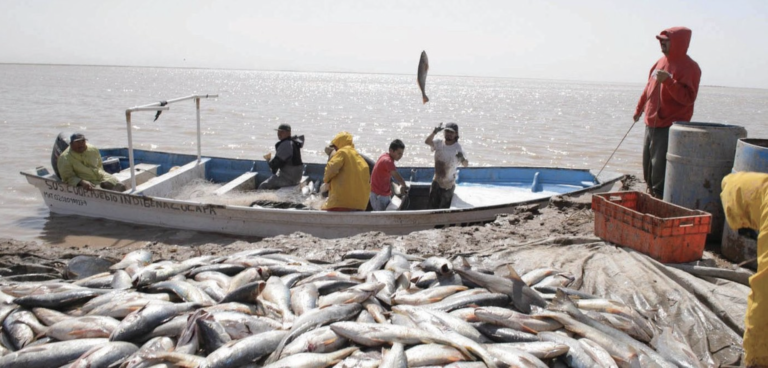
The United Nations Decade of Ocean Science for Sustainable Development 2021-2030 (the Decade) is a mere 5 months away and work has been ongoing to prepare for its arrival. As a whole, the Decade encompasses participative and transformative approaches to solving our world ocean’ issues with the ultimate goal of better benefiting both our oceans and the people who depend on them. For fisheries specifically, the hope is for sustainable harvesting and a productive ocean into the future.
Alfredo Giron, PhD, is a Mexico City native, current UC Santa Barbara post-doc, UNESCO Intergovernmental Oceanographic Commission (IOC) co-chair for the Early Career Ocean Professionals (ECOP) working group, and overall fisheries enthusiast. Giron’s approach to fisheries work boldly embodies the Decade’s motto ()lithe Science we need for the ocean we want’ and emphasizes the need for multi-disciplinary work. ECO interviewed Giron to gain his perspective on the interface of ocean science and fisheries and how his work ties into the Decade’s overarching goals.
Accurate fisheries statistics and models are often hard to come by and fisheries management suffers as a result. Giron’s own PhD analyzed fisheries in the Gulf of California, where oversimplified models have long been used to calculate Mexican sardine statistics. Giron’s response to this?
‘I think we can do better. It’s a problem all over the world. How do we move from relationships that we assume to be true to studying interactions in the real world and with real data?’
It’s a fair response. But just how do we do this?
ECO: Why did you choose to become involved with fisheries and what does your current work encompass?
AG: When I first went to La Paz in Baja, California, I started seeing the issues that the ocean faces from an oceanography perspective—like how the environment drives life in the ocean. I did my PhD at Scripps and transitioned into fisheries in Octavio Aburto’s lab, where it’s very much applied science. Octavio—1 like his style of doing things—always, always, always connecting science to the general public and decision making.
My current post-doc is with two organizations—Future Earth and the National Center for Ecological Analysis and Synthesis at UC Santa Barbara. My project work focused on research relevant to the Palauan government’s declaration of a National Marine Sanctuary within 80 percent of its Exclusive Economic Zone (FEZ). The Palauan President requested a partnership with a group of experts from the Palau International Coral Reef Center (PICK) and Stanford’s Center for Ocean Solutions (COS) to co-develop a report on what to expect for the sanctuary. So the bulk of my post-doc work for the last year has been jointly coordinating this group of 40+ experts to produce the report. I specifically looked at the tuna fisheries. Are they going to be profitable? Is the sanctuary going to have an impact on the reef fish? The sanctuary was fully implemented in January [2020]. One of the things we noted was that it became unprofitable to fish tuna in Palau, so, among other reasons, tuna supply dropped and the pressure on the reef fish increased.
And there were some lessons learned. For example, [local] people felt that they were not included in the design of the sanctuary, so this inclusion will be done more often now. But how do we get rid of the negative effects and keep the positives? There are continued aims of regaining a healthy [tuna] supply and ensuring that managers can effectively track the progress of the sanctuary. P/CRC, COS, and others in the community are thinking this through.
One key vision of the Decade is to ‘foster new joint research and cooperation within and across ocean basins.’ Giron brings cross-oceanic knowledge to the challenges experienced in Palau. Overall, it’s a coordinated effort that encourages inclusion and relies heavily on stakeholder participation.
ECO: What are some of the non-science skills that you need to be successful in this role?
AG: Networking—either online or in-person, instantly when you meet someone, and over the long-term; it’s building a professional network by any means and continuing being engaged. In the end, no one can accomplish anything by themselves.
And storytelling. We never learn about the importance of storytelling. We are taught to display graphs and describe the axes, pretending that everyone understands, but what we should really be learning is how to tell the story to the audience – how to communicate and propose solutions to others. It’s completely essential.

It’s easy enough to understand Giron’s aptitude in this sector, based on his passion and scholastic background. But what about the rest of us?
ECO: What’s the best way for the non-technical / non-science population to interact in the fisheries space?
AG: Try to learn where the fish that you eat is coming from. One of the best options for this is Seafood Watch from Monterey Bay Aquarium. But honestly people shouldn’t stop there. Look up more information to educate yourself Be more conscious about what you eat and where it comes from. You’ll find that even if you try, it’s really hard to find out where your fish is coming from, farmed or not.
ECO: What areas of the world need the most attention when it comes to better fisheries management and practices?
AG: I was actually just working on a research paper about this prior to our conversation. It’s a really hard question, and no answer will be completely right. In my approach, I’m mapping it out—where the majority of poor fisheries are in the world, could be an indicator for how effective fisheries management is. The data points to SE Asia and the small island developing nations as being in need of the most science and attention. It seems like the developed nations are exporting their environmental footprint to those countries but not exporting the science to manage their fisheries.
Exporting and sharing the science is exactly what the world needs. Giron’s attention to detail, physical oceanography background, and overall passion for people make him best equipped to work in fisheries. If Giron’s work has been yet preparation for the upcoming Decade, we can have great hope for the positive outcomes we will see in the next 10 years and beyond.
Author
Megan Fraser
